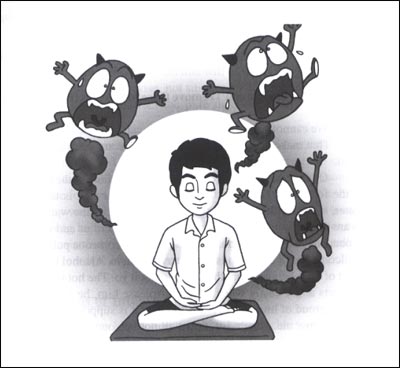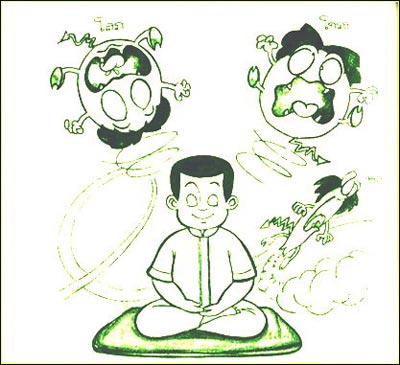The Practice of Austerities#1
We cannot see the defilements.
Putting into practice the sexual restraint and persistence is needed to destroy the temptations in the mind through the practice of gradual and intense austerities.
Why do we have to practice the austerities?
Once passing the 30 steps of Buddhist practice, we should find that we still have many impurities that can be improved upon. Consequently, we may be able to improve such impurities as hot temper, greed, jealousy, condescending attitude, etc. However, many impurities still remain such as selfishness, sexual abuse, vanity, laziness, complacence, depression, etc.; we need to practice the next step. There are two things you should keep in mind:
1. The cause of these defects comes from defilements hidden within our minds.
2. The reason that we can’t remove these impurities from our minds is:
- We cannot see the defilements. We can only see the symptom of them. That makes us unable to realize that we are getting attacked by them.
- Our minds become accustomed to impurities like the tiger adapts to the forest and fishes get used to water.If the fish is taken out of water, it will battle for its life to find a way back to the water. Most of us are the same, we feel that defilements are part of us and we become dependent on them. Alcoholics love alcohol. If someone pulls the bottle of alcohol out of their hands, they may kill them. Alcohol becomes the heart of their being so that they will not let it go. The hot tempered one that gets angry easily when people displease him, he would admit it and be proud of himself. “That is the way it is supposed to be, people should know me. Otherwise, they will not be courteous.” He is proud of his defilement within him. That is how it is.
- Lack of the appropriate methods to clean up the impurities. If the Lord Buddha was not born we would not born we would not know how to get rid of the defilements. We may know the existence of defilements; even though, we do not know how to clear them out. We may find the wrong solutions such as fire worship, deity worship, etc.
In this blessing, the Lord Buddha teaches us the proper way to quickly clean up impurities permanently with the principle of “The thorn splinters, use another one to remove it”.
When the defilements burn our hearts so badly, we must use the fire to burn it back. But only the internal flame can burn out the internal defilements.
The word used for ‘practicing austerity’ in the Pali is ‘tapa’ which literally means to make something hot. It can mean to roast, to boil, to grill or to smoke-anything that burns or heats or heats something. It is not the same as ‘tapas’ – better known as a small savory dish found in Spanish bars-although their readers may find this a good ‘aide-memoir’! If you can burn out the defilements all that will be left is the unblemished mind. Such a pure mind is wise, not susceptible to anger etc. It is like heating upcrudeore to extract the pure metal that can be used for something useful.
In order to banish something, we would have to make sure that we do not serve to its needs. Like when you want drive someone out of the house, you wouldn’t give them money if they wanted money, wouldn’t give food to them if they wanted it, and wouldn’t give them shelter if they wanted it. That means you have to force them to leave. The same thing happens when we want to banish impurities from our minds. The main thing is to avoid providing for its needs. This is called the intensive removal of defilements.
That makes us unable to realize that we are getting attacked by them.
Thirteen forms of Intense Austerity.
In Buddhism there are 13 practices monks usually decide to conduct in order to deny the needs of defilements and expel them out of our minds. It is called “Dhutanga-wat” in Pali. Monks who practice the “Dhutanga-wat” is called “monk on pilgrimage”. Anyway, this “Dhutanga-wat” is not only for the monks, laypeople can also practice it.
The Buddha categorized the most common bad habits of people into four major categories: habits concerning dress, habits concerning food, habits concerning accommodation and habits concerning laziness. There are thirteen different forms of the “Dhutang-wat” practice and they address these four major types of bad habits.
Habits concerning dress
1. Rag-robe wearer’s Practice
Wearing only robes made from rags retrieved from a dust heap or from a funeral ground.
2. Triple-robe wearer’s practice
Only three robes are allowed for monks to use, this is the upper robe (uttatasankam), the outer robe (sanghatim) and the waistcloth (antaravasakam), These three robes are supposed to be adequate to keep monks warm even in the coldest of weather, If you practice “dhutanga-wat”, only three robes are allowed.
Thke a look at what we’ve been practicing so far, how much the impurities have been damaged. The showy person, egocentric person, or vain person who is never satisfied with the amount of clothes they have will find the next two practices to be very challenging.
Habits concerning food
1. Alms food-eater’s Practice
No matter who offers fancy food to the temple, monks who practice “Dhutanga-wat” will not eat it. They will only eat food that has been received on his alms round.
2. House-to-house seeker’s Practice
For this practice, you are only allowed to go for alms rounds along prescribed routes. You may not go on alms rounds to places where you think you might get better food. You cannot just go down a street where you know plenty of rich people live who might give you appetizing food.
3. One meal eater’s Practice
Once you finish eating and stand out of your seat, you will not accept any food for the rest of the day. That means you only eat one meal per day called “Chan-Eaga”.
4. Bowl-eater’s Practice
This practice entails eating all your food mixed up together. In a single bowl all the food will be mixed up, no matter whether it be rice, chocolate powder, fish soup or whatever. You will not eat food from other containers. You will eat only food within your bow1.
5. Late-serving refuser’s Practice
This practice entail not accepting further offerings of food once you have already started eating.
Thoe five practices in the second category are about food, it is to reform the habit of being self-indulgent about food. We don’t even talk about stealing of food, being fraudulent about getting food or even getting too much fancy food, eating too often. People who are so extremely picky about their food allow their impurities to force them to do wrong. These people will find the following five practices to be very challenging.
Commitment to meditate
Habits concerning accommodation
1. Forest-dweller’s Practice
Living only in shelters in the forest and never using accommodation in the town.
2. Tree-root dweller’s Practice
Living in the forest under the trees, not living with any building for shelter, staying under a tent or a mosquito net only.
3. Open-air dweller’s Practice
Living out in the open, not even using the trees for shelter. This is to reduce your luxury sense desire.
4. Funeral-ground-dweller’s Practice
Living only in a graveyard. You can sit or sleep on top of coffin. Or you can stay in the tent under the tree in the cemetery.
5. Any-bed-user’s practice
You will stay at any place where someone provides it for you. You will not select any places to stay.
We are not talking about the corruption of lands, defrauding the title deed; this is all about the residence. Only the habits of staying in dwellings, becoming dependent on soft comfortable beds, luxurious houses, comfortable facilities that are referred to in the five practices mentioned above will allow your impurities to get out of control.
Habits concerning idleness
1. Sitter’s Practice
Only allowing three body gestures: standing, walking, and sitting. No lying down. If you are very sleepy, you can stand, walk or sit to sleep. But you cannot lie down. You back cannot not touch the ground.
The forth category is to destroy the idle habit of people who love sleeping in the morning. Afternoon, evening and night. The idle habit will go away. If someone has the habit of procrastination, you can try practicing this category for one day, 3 days, 5 days or 7 days depending on your capability. For the meditation person, when your experience tremendously. If your meditation progress is good, you will not fall asleep. Some monks can continue this practice for 3 months, 7 months or for their whole life. For example, Venerable Maha Gassapa, who lived at the time of the Lord Buddha, could keep this practice for his whold life without falling asleep. The Lord Buddha admired him as the master in “Dhutanga-wat”
All of the above are 13 practices of “Dhutanga-wat”, which is the main focus of “tapa” or austerities in Buddhism. The purpose of practicing this is to eliminate the impurities within the mind completely. In practice, you can select 1 to 13 practices out of those 13 practices. You can practice them within any period of time you feel convenient; then, you make a commitment to do it.
Practicing Austerities in Daily Life
Some of us may be in doubt of how to practice these austerities while we are laypersons who still work and can hardly practice it in real life. The most we can do within a certain period of time or over the weekend or summer time would be to go out and stay a tent in the forest. How about practicing in daily life, can we still practice it? The answer is “Yes”.
The purpose of practicing austerities in daily life is to prevent the impurities from rising inside us again.
The way to do this is as follow:
1. Restraint of the senses
2. Commitment to meditate
Meditation - Related Articles
" />
" />
" />
" />
" />
" />
" />
" />
" />
" />
" />
" />








